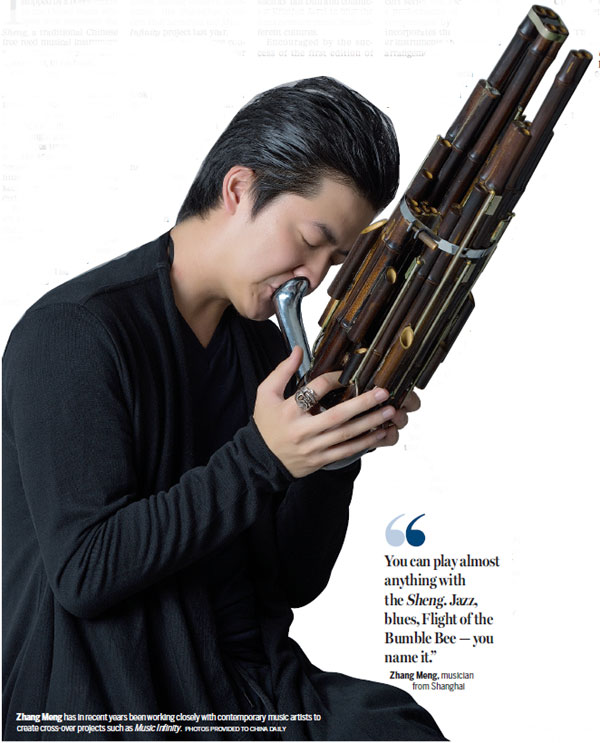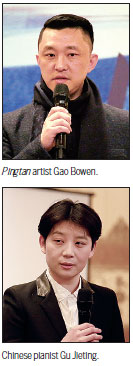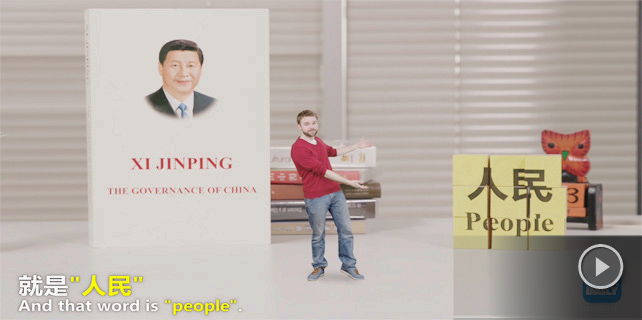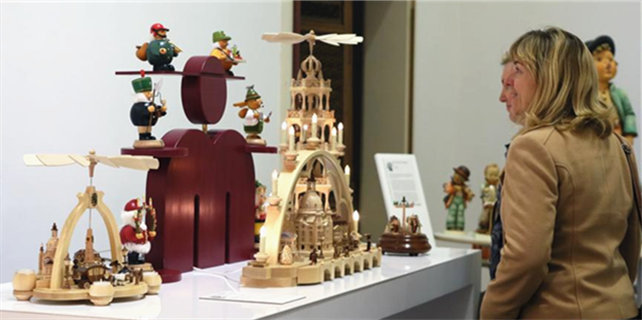A performance of synthesis

Music Infinity, a unique concert series by the Shanghai Concert Hall, returns this year and promises to wow audiences with its blend of old and modern, Chinese and Western
In 2013, Zhang Meng was stopped by a police officer in the United States who eyed with suspicion the Sheng, a traditional Chinese free reed musical instrument with a history of more than 3,000 years, in his hand.
Consisting of a cluster of pipes that is attached to a curved mouthpiece, the musical device can at certain angles look akin to a small Gatling machine gun.
"I brought it out and played some blues tunes for the officer. He seemed to enjoy it because he started dancing a little. He even told me to 'just keep it going'," said the musician from Shanghai.
The good-humored encounter, said Zhang, illustrates how the Sheng is still a strange object to many people despite it being regarded as the first free reed instrument in the world. The Sheng is considered the ancestor of musical instruments such as the accordion, harmonica and concertina.

In order to raise the awareness of traditional Chinese music among modern audiences, the Shanghai Concert Hall launched the Music Infinity project last year.
In March 2016, three concerts featuring a cross-over of traditional Chinese music, opera or theater with contemporary and Western music took place at the concert hall in downtown Shanghai and received acclaim from audiences as well as critics, said Fang Jing, vice manager of the concert hall.
Zhang, who is in his 30s, had started working on such cross-over projects since he graduated from Shanghai Conservatory of Music in 2011, working together with contemporary music masters such as Tan Dun and conductor Kristjan Jarvi to blur the lines between music from different cultures.
Encouraged by the success of the first edition of Music Infinity, Fang added that the concert hall would be introducing the second installment of the project on March 11 this year. The concert series will kick off with a performance of a musical composition by Zhang that incorporates the Sheng, other instruments and electronic arrangement.
A show for everyone
Zhang, who can play more than 20 wind instruments, has composed works for traditional Chinese instruments, the saxophone and even electronic music with multi-media projections. He described the upcoming concert as "a fusion feast where everybody will be able to find a dish they like".
On his program this year will be two classical pieces that shine the spotlight on the Sheng. One of them is a lyrical love song while the other is a concerto of Sheng and Chinese drums that depict an ancient battle. The purpose of these two pieces, said Zhang, is to show the audience how the Sheng and Chinese folk music have evolved throughout the years.
He added that musicians have since the 20th century been constantly making changes to the instrument in order to enhance its sound quality and volume and increase its range. In the early days, the Sheng used to consist of just 17 pipes. Today, the instrument has a modern 37-pipe version, which according to Zhang, allows the musician to play a wide variety of music genres.
"You can play almost anything with the Sheng. Jazz, blues, Flight of the Bumble Bee - you name it," said Zhang.
A new composition that he will premiere at the concert is titled Underwater Hallucination. This electronic project combines sounds from daily life as well as "out of tune noises" he discovered while repairing the Sheng.
"You will experience the music and LED images as if it's from the bottom of a pool. I wish to inspire people's sensitivity for the details of life with this project," said Zhang.
Two of the featured artists at Music Infinity 2017 are Pingtan artist Gao Bowen and pianist Gu Jieting, individuals that Zhang described as having a penchant for the unconventional.
"We are all rebels. We all want to create something different from everyone else. Once you make up your mind to achieve that, you no longer care about other people's judgments," said Zhang at the news conference introducing Music Infinity 2017.
Debussy x Kunqu
On March 18, Gu will present her concert I/Fantasie which features a combination of Claude Debussy's music with Chinese Kunqu.
Originating in the Yangtze River Delta region in the 16th century, Kunqu is one of the oldest forms of Chinese folk opera. Recognized as a "masterpiece of the oral and intangible heritage of humanity" by UNESCO, it is renowned for its refined aesthetics and graceful expressions.
"I am from Suzhou. As a child I used to hear the radio playing Kunqu and Pingtan at my grandma's. The melodies still resonate at the back of my head till today," said Gu.
Gu said that she has been fascinated with the compositions of Debussy ever since she was just a music student. This interest soon took her to France where she would further her musical studies. There, she did research on how Eastern art and cultures had influenced Debussy's musical creations. The concert I/Fantasie, said Gu, is a way of presenting her research findings.
Gu has invited actors from the famous Suzhou Kunqu Opera Troupe to be a part of the performance. She said the concert "will be a dialogue between Kunqu and the piano".
One of the best-known repertoires in Kunqu is Peony Pavilion, a play depicting a young woman named Du Liniang who dies from lovesickness. Her ghost later falls in love with a young man. Gu said there is a connection between Debussy and the oriental aesthetic represented by Peony Pavilion. According to Gu, I/Fantasie will see Du's ghost stepping into the musical realm of Debussy.
Gu said that the female ghost's encounter with Debussy will span four chapters and take audiences on an emotional journey. While she plays her selection of Debussy works, Kunqu actors will be performing and singing, showcasing a unique choreography.
Jazz x Pingtan
Come March 25, Gao will be performing with a jazz band to present the Gao Bowen & Friends Pingtan Opera Concert, which features the traditional repertoire of Pingtan, or Chinese folk songs, rearranged in jazz and modern music styles.
"Today's young people no longer know about Pingtan. Their impressions of it come from their grandparents," said Gao, the deputy director of the Shanghai Pingtan Troupe.
The folk art often known as Suzhou Pingtan is a narrative music performance that is about 400 years old. It features one or two performers playing a three-stringed lute or pipa while singing to tell a story.
Gao said that he and his colleagues have been trying to make this old art form more palatable to young audiences by collaborating with rock and pop musicians as well as jazz bands. He said that the new rhythms and styles created will evoke a curiosity about Pingtan and spur young people to learn more about its rich history.
Trained solely in traditional folk art, Gao concedes that he knows little about Western music theories. However, he has nevertheless managed to establish great understanding with the jazz band that he will be performing with.
"I can speed up or slow down and the band will complement me seamlessly. With the drum, bass and other instruments setting the ambience, I am able to focus on the story and characters," said Gao.
"Cross-over projects are not necessarily the only way to raise awareness of this art form today. I see them as just an option among many others. Pingtan is a versatile art. I believe it will find resonance in a changing world."
zhangkun@chinadaily.com.cn
















